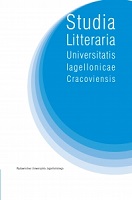Morbus melancholicus : aperçu préliminaire (Pseudo-Aristote, Marsile Ficin, André Du Laurens)
Morbus melancholicus: A Preliminary Overview (Pseudo-Aristotle, Marsilio Ficino, André Du Laurens)
Author(s): Barbara MarczukSubject(s): Social history, Health and medicine and law, 15th Century, 16th Century
Published by: Wydawnictwo Uniwersytetu Jagiellońskiego
Keywords: Renaissance; humoral medicine; creative genius; atra bilis;
Summary/Abstract: Since Hippocrates until the 18th century, physicians considered melancholy a chronic disease caused by the overabundance of black bile (atra bilis), mythical ‘humour’ whose existence is refuted by scientific medicine. The article describes the aetiology, nosography, and therapy of this disease, presented in André Du Laurens’ treatise Second discours auquel est traicté des maladies melancoliques et des moyens de les guerir (1597), as well as the conceptions of Marsilio Ficino expressed in De vita triplici (1489). Referring to the ideas contained in Problem XXX attributed to Aristotle, the Florentine philosopher develops the idea of the relationship between the melancholic humoral predisposition and the creative genius. Ficino proposes the conversion of the harmful force of melaina chole into creative energy: melancholia generosa. The ‘priests of the Muses’ can escape the evil influence of their patron Saturn through intellectual and artistic activity.
Journal: Studia Litteraria Universitatis Iagellonicae Cracoviensis
- Issue Year: 17/2022
- Issue No: 1
- Page Range: 1-10
- Page Count: 10
- Language: French

